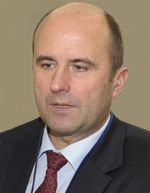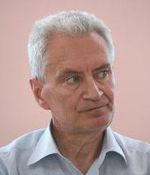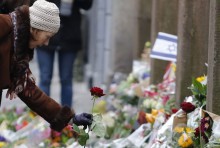Islamic radicals appear to be showing an increasing degree of intolerance of the freedom of expression and of the “infidels” in Europe, as evidenced by the Saturday attack in Copenhagen when one person was killed and three police officers injured at a free speech debate in a cafe on February 14 (followed by the second attack when a Jewish man was killed and two police officers wounded near the city’s main synagogue). Among the cafe attack victims was Lars Vilks, whose Muhammad drawings controversy began in July 2007 with a series of cartoons that depicted the Islamic prophet Muhammad as a roundabout dog (a form of street installation in Sweden). Those present at the cafe intended to discuss, among other things, the recent assault and battery against the cartoonists of Charlie Hebdo. The attacker, wearing a balaclava, must have acted solo, but the Danish police proved quick and efficient. A cabbie identified the man after being shown a security camera footage. The city streets were blocked and the man was eventually killed in a shootout with the police.
Here one can’t help drawing parallels between what happened in Copenhagen and in Paris on January 7, 2015, when, at about 11:30 local time, two Islamist terrorists armed with assault rifles and other weapons forced their way into the offices of the French satirical weekly newspaper Charlie Hebdo. They fired up to 50 shots, initially killing 11 people and injuring 11 others, shouting “Allahu Akbar” (Arabic for “God is [the] greatest”). In both cases Jews and cartoons were the targets of attack.
The French ambassador Francois Zimeray, who was attending the free speech conference at the cafe when it was attacked, said: “I think he wanted to repeat what happened in Paris. If the Danish police had not been there, we would all have been killed.”
Denmark’s centre-left Social Democrat, Prime Minister Helle Thorning-Schmidt, described the killings as “a cynical act of terror.” French Prime Minister Manuel Valls said after the attacks in Copenhagen that “France will not surrender” and published the famous slogan “Je suis Charlie” on his Twitter. French President Francois Hollande in his communique expressed solidarity with the Danish people. British Prime Minister David Cameron made a statement that read, in part: “The shootings in Copenhagen are an appalling attack on free speech and religious freedom. Two innocent people have been murdered simply for their beliefs and my thoughts are with their loved ones and all those injured at this tragic time.”
The Day asked the experts for comment on this outburst of Islamic radicalism in Europe and on what is being done to combat this evil force.
 Roland FREUDENSTEIN, deputy director, Wilfried Martens Centre for European Studies, Brussels
Roland FREUDENSTEIN, deputy director, Wilfried Martens Centre for European Studies, Brussels
Don’t you think it is a dangerous tendency that such an attack first took place in Paris, and now in Copenhagen?
“Of course, indeed. But it seems like Copenhagen was a replica of the Paris attack. And this you see by the choice of the targets. It was a cartoonist and a journalist advocating freedom of opinion, and then it was Jews. The Paris attack clearly had a link to ISIS, and these people were connected to ISIS networks. The Copenhagen one seems to be a slightly different type of activity. It is the so-called lone wolf, it was one guy acting alone, radicalized himself mostly on the Internet, as far as it’s known, and he has no obvious links to ISIS, but all this is tentative, we don’t know yet exactly.
“Also, by the way, it is a dangerous tendency, because it distracts attention from the conflict in Ukraine, from Russia’s aggression in Eastern Europe. That’s, by the way, a very important side effect of this. But we have to live with this. It’s a massive threat to the fundamental values on which our societies are built, and we will not give in. We have to be smarter in deradicalization of young people, young Muslims. We have to prevent the formation of the so-called parallel society, where our value system is systematically undermined. We have to invent and develop better integration policy for our immigrants from some Muslim countries.”
So, what exactly is being done on the level of the EU countries in general to deal with such attacks of Islamic fundamentalists?
“There is a European component, and there is a national component of this. Whatever refers to integration policies, will be largely on the national level. A better integration of migrant communities, a better access to the labor market, better education, all this is in national competence, and the European level has little to do with it. The European level comes in when we talk about the cooperation of intelligence services, the sharing of information, the Europe-wide list of dangerous persons, for example, passenger name records for airline passengers. These are all the topics where we need European cooperation, and this cannot be done just on the national level, that has to be done on the European level and, of course, together with our American friends and allies.”
What could be done to prevent the radicalization of Muslims in the EU?
“I think we have to be much more ambitious in developing a strategy to reach frustrated young men (because these are usually frustrated young men) that are in danger of turning to the radical ideology of jihadism. We have to reach them better, and we have to make them offers to lead a normal life, to make a normal career, to get a normal job, and live peacefully in our society. And we have not been successful in this so far, so we must improve our strategies.”
Does Europe see the connection between the radical Islamic State movement and the “Russian world,” which is promoted by Russia through illegal occupation of Crimea, and now also through an attempt to create an enclave of the “Russian world” in Donbas?
“I don’t see a direct connection here, but there certainly is an effect because, as I said, terrorism takes a part of our attention away from Donbas and Russia’s aggression, and also, some people have been saying now since Paris attack that the real enemy is ISIS, and we need to team up, to ally ourselves to everyone else, except for ISIS. That includes, of course, in the minds of those people like Czech President Zeman, Iran and Russia. And these are the countries with whom he wants to cooperate against ISIS. I think that’s a wrong view, I disagree with this view, and I think that ISIS may be the acute danger for the moment and the next couple of years, but Russia is a much, much bigger threat to the fundamental values of our societies. Russian aggression also has a very strong component inside our countries with radical parties on the right and on the left that are directly supported by the Kremlin, including SYRIZA, for example, the governing party of Greece. And there are many people in the media, politics, and business, who are bribed and corrupted by Russian agencies and organized crime. If you look at the Russian paid trolls in social media, all these are also effects that go directly into our societies and countries. In both cases, in this fight against ISIS and in the fight against Russian aggression, we have a very strong domestic component, and a classical distinction between foreign policy and domestic policy is actually put out of function here.”
By the way, recently senior fellow at the Center for European Policy Analysis, author of the book The New Cold War Edward Lucas said in an interview that Ukrainians are paying a high price for Europe’s geopolitical education. What is your opinion on this?
“I can basically agree with this. Of course, he was describing something he criticized, he didn’t say it with any satisfaction. And I would agree with him on that. It’s true that Ukrainians today are paying a price for Europe’s slowness in waking up to the Russian threat. As President of Estonia Toomas Ilves likes to say, Georgia in 2008 was a wake-up call, but we have been hitting the snooze button ever since. And that’s true. I think if we had shaped up in our defenses, improved our deterrence, worked for a better governance and rule of law in the Eastern Partnership countries earlier, like in 2008, maybe it wouldn’t have come to this. But of course, let’s face it, there is also a very large domestic component in Ukraine, and the fact that nothing has happened in true reforms of the Ukrainian economy and public administration for over 20 years, that’s not entirely Europe’s fault. And this weakness of the Ukrainian state and economy has contributed to the situation too.”
So, is Europe waking up at last?
“I hope so, yes, some people are. There are those still asleep, and we are discussing this every day in Brussels and in every meeting of the European Council and foreign ministers, and so on. We have discussions between those who are awake, and those who are still asleep.”
 Viacheslav SHVED, acting head of the Department of History of Asian and African Countries, Institute of World History:
Viacheslav SHVED, acting head of the Department of History of Asian and African Countries, Institute of World History:
“I believe that there is someone somewhere banking on a division of the Western world and that of Islam, doing so using radical Islamic structures. There are a number of reasons. First, Europe is trying to implement a new policy in regard to the Islamic ethnic communities. They are revising their multicultural policy that used to be conceived in a simplistic manner, proceeding from the assumption that the [ethnic] Muslims can and will eventually become French- and/or German-minded, and will assimilate into the Western culture and mentality. This never happened and these Muslims are taking a jealous care of their tradition, mentality, and values. This has resulted in a crisis of sorts within the Muslim ethnic communities.
“Second, the leaders of European countries and the United States are effectively looking for new methods and ways of cooperating with the Islamic world. This leads to the strengthening of their sociopolitical stability. Apparently, this runs counter to the aspirations of those forces that are seeking a confrontation between Europe and the Islamic world. I still can’t see the reason behind the irresponsible editorial policy of the French periodical Charlie Hebdo, considering that they indiscriminately published all those Muhammad cartoons, being aware that all such other publications had been strongly criticized by the Muslim community at large. Muslim satire has no room for burlesque addressing the Prophet, God, Church, you name it. They do not see the Church the way the Christians do, including the Holy See. In a most democratically advanced Muslim society anything that offends the Prophet, Muhammad, is punished by death. We do not seem to be able to realize this, that this is too serious a subject to fool around with. They [the Muslims] are the way they are. I don’t know how long it will take to change their attitude to their [spiritual] values.
“Third, I believe that someone somewhere took the best advantage of what happened to that French periodical several months ago, in order to sharply aggravate the confrontation between the West and the Islamic world, even though Muslims were mostly in the front ranks of protesters who were abhorrent to the massacre of French journalists. There is the phenomenon of self-ignition, like when a forest fire comes out of the blue. That’s precisely the way such structures and threats are spreading over Europe. Overstatement is apparently the case.
“As for the threat of Islamic radicalism, the [European] countries must be looking for joint measures to combat it; active diplomatic and political efforts are being made, and the clandestine agencies are involved. These efforts, however, may prove insufficient while the jihadists are effectively using cyberspace for bullying and creating panic, although this does not necessarily mean that they are actually effective. After 09.11.01 the United States effectively sealed off its territory. I can only think of the Boston bombings involving two Russian brothers (April 15, 2013). That was all. The rest of the potential terrorists were neutralized. The British clandestine agencies acted pretty much along the same lines while closely cooperating with the ethnic Muslim communities. Muslims in the UK are actively collaborating with the authorities, including the secret police, against the terrorists.
“Russia has been actively provoking the Muslim ethnic communities in Ukraine into resisting the government, while trying to split them and create puppet Muslim structures, with Moscow pulling the strings. Precisely what’s happening in Crimea – I mean the formation of the Taurian Muftiyat. Efforts are being made to create something like what happened in Donetsk and Luhansk oblasts where [the Moscow-backed separatists] formed the DNR and LNR. Now this is a clear and present danger, something to be combated using all resources. And I can tell you that the ethnic Muslim community in Ukraine is making every effort to do just that.”
Interviewed by Natalia PUSHKARUK








